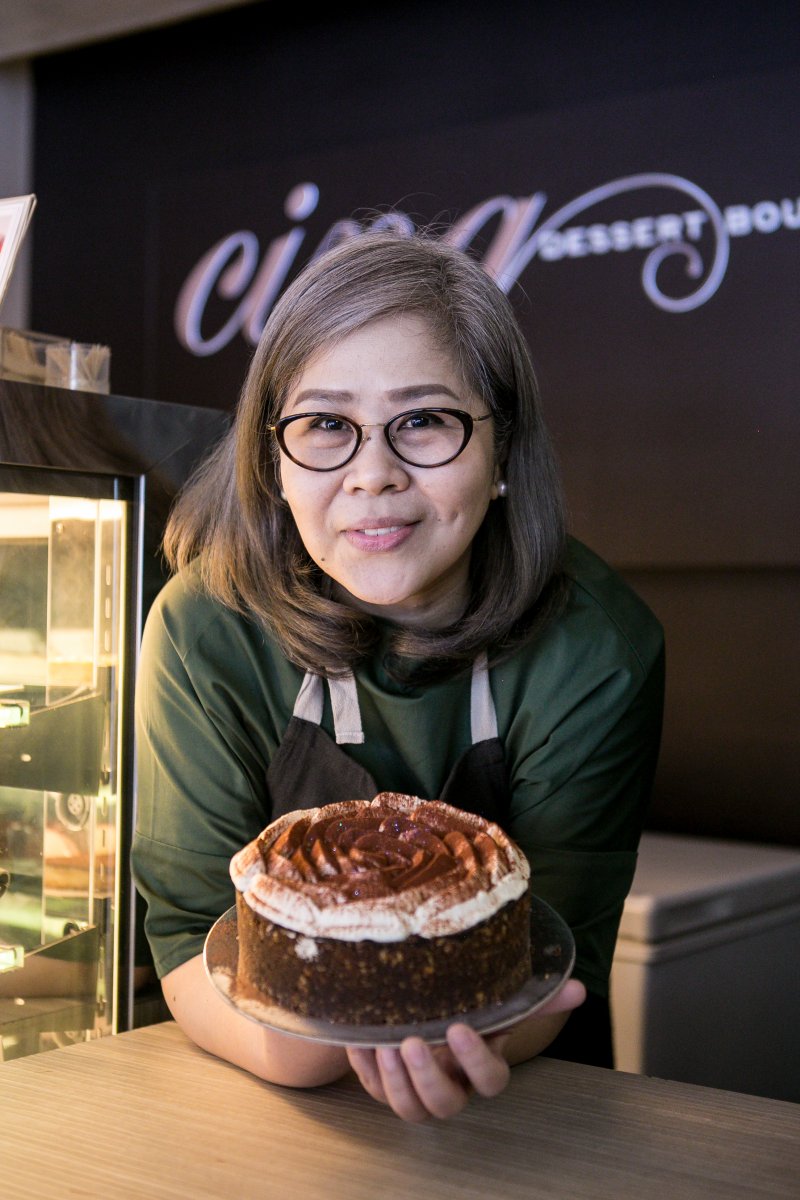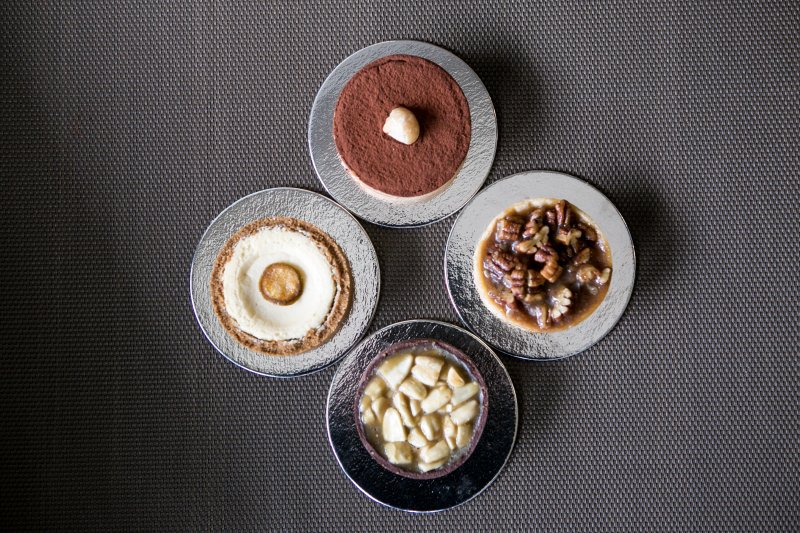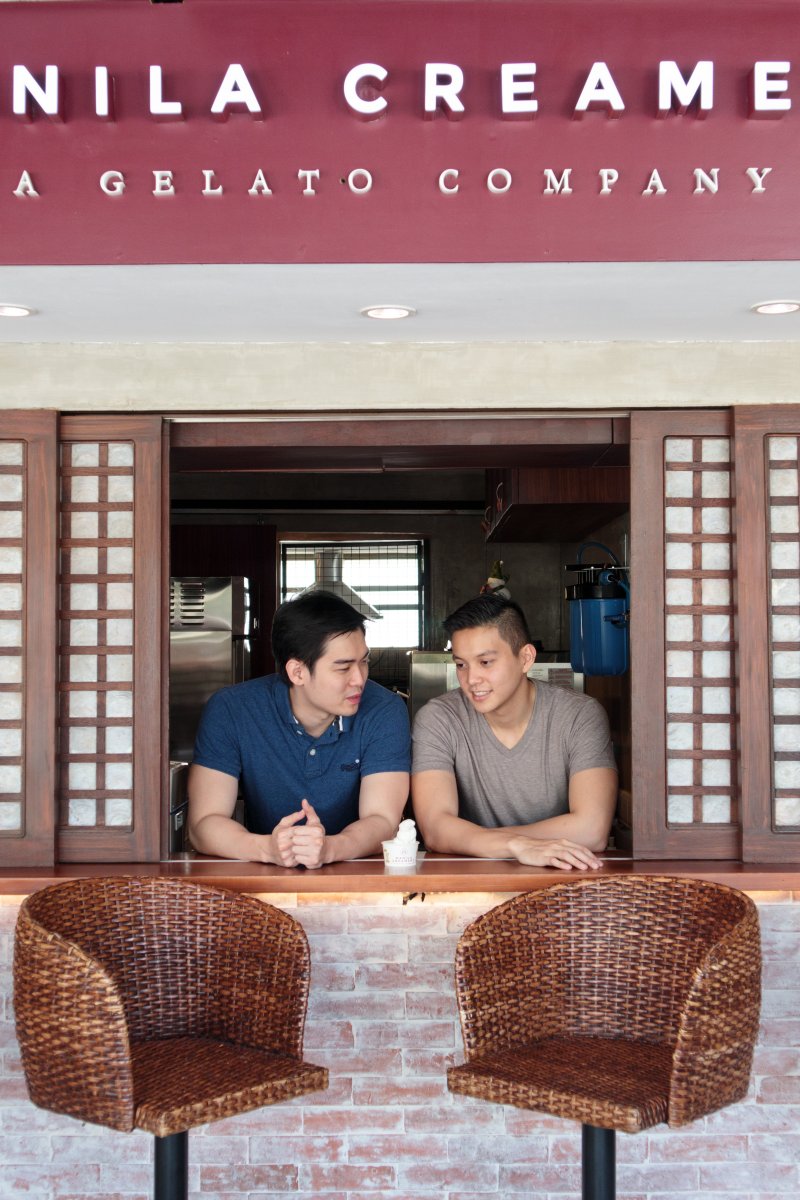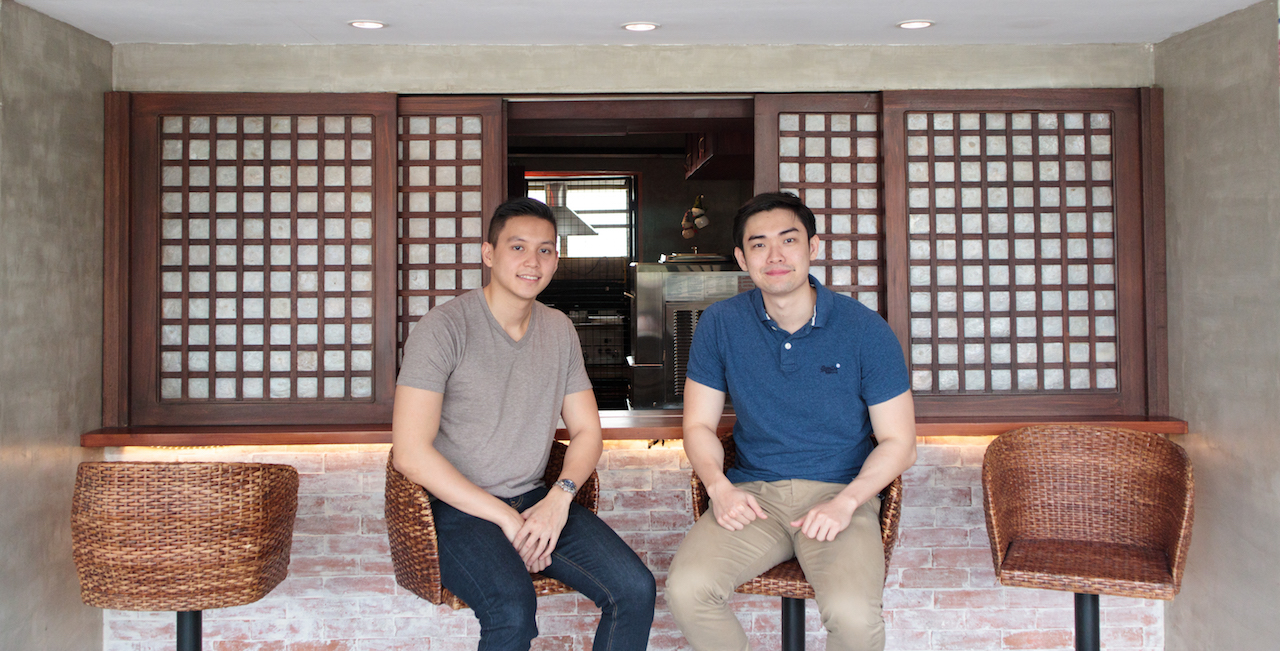“To this day, I don’t cook,” says Angela Villoria decidedly. Her brows furrow at the mention of having to deep-fry anything but utter a word about baking and her face lights up immediately.
Villoria is the owner of French-inspired pastry boutique Cinq. It only took one bite of a cake baked by her sister to convince the then-interior designer that she was meant to make pastries. “It was an angel fruit cake with lemon sauce. It was so good that I said, ‘I want to learn how to make that.’ My sister taught me how and I couldn’t even fold.”
Before Cinq opened in 2013, Villoria was an interior designer for 12 years. The practice landed her several projects from corporate bigwigs and even led her to working in Hong Kong before she returned to Manila in 2002. She was happy and content conceptualizing spaces, but pastry-making was a calling she couldn’t ignore. After taking culinary courses here and abroad, and with a little nudge from her husband, she decided to put up Cinq and pursue pastry-making full-time.
Conquering competition

“It wasn’t really planned. Actually, I was hesitant to open the shop because I knew it would entail a lot. I l knew it would be very demanding,” Villoria explains.
Running a pastry shop would prove to be just that—demanding, draining, exhausting—to the point that she would question ever leaving interior design in the first place. As it turns out, loving to bake was one thing, but turning it into a full-blown business that would stay afloat amid tough competition was a whole other matter.
Manila, after all, has seen “a five percent growth of new food establishments” since 2011. Food writer and entrepreneur Peter Pysk called this the “big kaboom,” citing that 3,000 food and beverage businesses have popped up “in the past two years since 2014,” making competition tougher and restaurants’ mortality rates higher.
When you own a startup with a limited number of hands helping out, you can’t simply focus on one aspect of the venture. You wear many hats and burnout comes quickly to those who can’t handle the heat.
“It’s the business side that’s difficult for me. I don’t really have a marketing person. I don’t even have a driver and I outsource my accounting,” says Villoria. “There are times that I don’t have enough sales. I’d like to focus on creating new desserts all the time if I could, but there are times I have to solve problems and do paperwork.”


And even if she did have the time to create desserts to keep up with the never-ending demand for something new, Villoria admits that her price points are another thing to consider, especially when she caters to a market that will generally go for more convenient, affordable options.
Cinq’s tiramisu, for example, is made with mascarpone cheese instead of the usual cream cheese, and Marsala wine is never substituted with rum. This, along with painstaking labor, is what customers pay for. But the truth of the matter is, there are times when customers won’t even care to nitpick as long their sweet tooth is satisfied. And when you own a startup with a limited number of hands helping out, you can’t simply focus on one aspect of the venture. You wear many hats and burnout comes quickly to those who can’t handle the heat.
Sticky situation
Suzy Lee, who was behind the now defunct Chinese comfort food restaurant Spring by Ha Yuan, can’t help but agree. “I tried to slug it out and stay in the business but eventually it was really a personal decision. At that time, I felt like I didn’t like the person I was becoming,” admits Lee, who is currently chief technology officer for an artificial intelligence company based in Singapore. After operating Spring from 2012 to 2015, and even receiving culinary training for the venture, Lee closed shop to go back to computer science and information technology, which the data scientist practiced for five years until she tried her hand in the food industry.
Lee had always been into food, and this came as no surprise. Her family owns Ha Yuan, a Chinese restaurant that was started in the ’50s by her grandmother. Although it still stands today with the original branch along Masangkay in Binondo alive and kicking, Spring was Lee’s way of making the brand relevant to a younger audience.
Another misleading assumption about opening a business is that you handle your own time. In fact, most startups are the outcome of people getting tired of their monotonous eight-to-five gigs. But what people fail to realize is opening a business means having to work 24/7.
Like Villoria, Lee loved thinking of new food concepts and exploring the endless possibilities of mixing and matching flavors and textures. Spring was home to foie gras siomai, Nutella-filled buchi, and even kung pao pastrami. Combine this with Lee’s hunger to continue her family’s gastronomic legacy, and you’d think it was a foolproof formula for favorable results. With four branches in just three years, Spring proved to be a hit, but the success was short-lived.
“It was just me doing everything. I was really hands-on,” she says. “The thing is, and maybe this is true for a lot of people who go into the business, you start with passion for food, right? And then when you’re in the heat of things, you realize you have to tend to the business side of it, too. At the end of the day, it was just too stressful for me and the way I was reacting to the stress wasn’t good anymore.”
Another misleading assumption about opening a business is that you handle your own time. In fact, most startups are the outcome of people getting tired of their monotonous eight-to-five gigs. But what people fail to realize is opening a business means having to work 24/7. Say goodbye to holidays, weekends, and any semblance of a “normal” schedule because owning a business means you’re responsible for running it all days of the week.
Full-time affair

“It’s not as glamorous as my friends would think. In corporate, you go home, you don’t have to think of problems. We go home and there’s a problem, we have no choice [but to deal with it]. Dec. 25 was an example,” says Paolo Reyes, who quit his corporate job to open Manila Creamery, a gelato parlor he co-owns with Jason Go.
Reyes was referring to spending the past two Christmas Eves in their commissary making gelato for deliveries that had to be made on Christmas day. “I think it’s a misconception because people keep rambling online about how to be an entrepreneur,” says Go, who used to be a DJ before studying gelato-making in Italy. His DJing routine was burning him out and Reyes presented the proposition of putting up an ice cream shop at the right time. “Recently, I saw a post and it went, ‘Millennials working at the beach while sipping coconuts and making money.’ I was like, ‘No. What is that?'”
Sure, being young and having families that financially supported them were advantages that Reyes and Go recognized, but Manila Creamery’s growth since it opened in 2016 is also a result of having each other’s backs from day one. While Go is at the helm of creatives and Reyes is in charge of production, managing a staff of more than 20 employees is a shared task.

“We made a lot of mistakes along the way, small mistakes, but when you add them all up, they equate to losses,” Reyes recounts, confessing that at one point, he was on the brink of giving up. The duo admits that unavoidable circumstances make them rethink their choices. Doubt is an occupational hazard of being an entrepreneur, and is something that rears its ugly head from time to time.
But from dealing with suppliers who were taken aback by their obvious youth (they were just in their early 20s when they started out) to opening two branches in Manila to becoming a supplier of sorts themselves (next time you eat gelato at a hotel or cafe and it says it’s “homemade,” you might just be enjoying one of the brand’s creamy concoctions), the road to establishing Manila Creamery has had its gratifying moments.
Ripple effect
“You might find this hard to believe, but at the end of the day, it’s not just about the money we make. We rarely get paid because we’re in the process of expansion, but aside from getting income, you see your employees earning. They’re able to provide for their families,” Reyes says. “We don’t have end of contract, no agency. Everyone’s paid with benefits. Everyone’s paid the right amount.”
“I think it’s also a matter of how much you actually want it. Of course we wanted to make money, but what gets us through the day is doing something we love to do. I was really passionate about music. It took me about three years to get that same feeling, that same passion back in food,” Go adds.
For Reyes, Go, and Villoria, being able to provide livelihood through something they’re passionate about is one of the things that keeps them going despite countless obstacles the next day might bring. It causes a positive ripple effect that plays a part in nation-building and even trickles down to their employees’ personal development.
If you want to shift careers, and you choose to get your feet wet in the complex trade of perishables and edible goods, you had better make sure that you desire it enough to commit to the undertaking.
“In a way, you also help the economy. I do love my country. When you declare your income and you do your taxes right, that’s part of nation-building. You’re also educating people, you teach your employees work ethics, telling them that work isn’t only work,” Villoria says.
Even if Lee chose to close her restaurant, she admits that nothing beat the feeling of being able to help people through employment. Of course, getting good feedback from loyal customers and continuing what her grandmother started decades ago were also among the best bits of opening Spring.
But sometimes, the cons outweigh the pros, and it all boils down to self-mastery. If you want to shift careers, and you choose to get your feet wet in the complex trade of perishables and edible goods, you had better make sure that you desire it enough to commit to the undertaking.
“The question is always, ‘What do you want?’ Is it the kind of life you want?” Lee says. “It took a lot of humility to admit to myself that, ultimately, the business wasn’t for me. Having a business had me tied. I guess I wanted to be free of that. But some people can handle that. I guess their passion is enough.”
Originally published in F&B Report Vol. 15 No. 1





